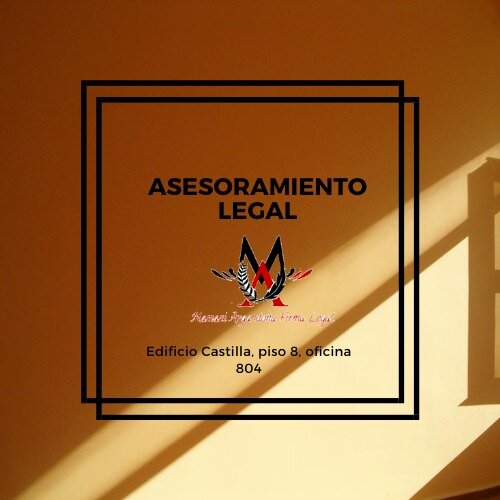Best Public-Private Partnerships (PPP) Lawyers in Bolivia
Share your needs with us, get contacted by law firms.
Free. Takes 2 min.
Or refine your search by selecting a city:
List of the best lawyers in Bolivia
About Public-Private Partnerships (PPP) Law in Bolivia
Public-Private Partnerships, often referred to as PPPs, are collaborative agreements between governmental bodies and private sector companies to finance, build, and operate projects that benefit the public. In Bolivia, PPPs are designed to facilitate infrastructure development and improve public services by leveraging private sector resources and expertise. The Bolivian government has established regulations to formalize these partnerships, encouraging investment in transportation, energy, healthcare, education, and other sectors crucial for national development.
Why You May Need a Lawyer
Entering a PPP involves navigating complex legal frameworks and negotiating detailed agreements. Individuals, businesses, or organizations may require legal assistance for several reasons, including:
- Understanding eligibility requirements and government procedures for initiating a partnership
- Drafting or reviewing investment proposals, contracts, and partnership agreements
- Ensuring compliance with Bolivian law, including environmental, labor, and procurement regulations
- Resolving disputes between public and private partners
- Managing risk, liability, and intellectual property issues
- Facilitating financing and structuring investment frameworks
- Advising on tax implications and benefit structures related to PPP projects
- Protecting your interests during project implementation, monitoring, and evaluation
Legal guidance helps prevent misunderstandings, ensures compliance, and increases the likelihood of a successful and sustainable partnership.
Local Laws Overview
Bolivia's legal framework for PPPs is primarily guided by national laws and specific regulations that promote public and private sector collaboration. Key aspects of local laws related to PPPs in Bolivia include:
- Legal Basis: Bolivia has enacted specific PPP laws and regulations to provide a clear foundation for collaboration. The legal framework outlines the eligible sectors, forms of partnership, and state powers and responsibilities.
- Project Identification and Promotion: Both public authorities and private investors can propose projects. The selection and approval processes follow set guidelines to ensure transparency and alignment with national development priorities.
- Contracting and Procurement: PPP arrangements must comply with regulations around competitive bidding, contract terms, risk allocation, and standard performance requirements.
- Concessions and Licenses: Certain projects, such as infrastructure and utilities, may require concessions or licenses, which are regulated and monitored by designated government agencies.
- Monitoring and Oversight: PPP contracts include provisions for ongoing monitoring, evaluation, and reporting by authorities to ensure compliance and successful delivery of services.
- Dispute Resolution: Local laws establish procedures for resolving disputes, often encouraging negotiation, mediation, or arbitration before resorting to the courts.
Understanding and following these laws and procedures can be complex, so seeking legal advice is strongly recommended before entering a PPP arrangement in Bolivia.
Frequently Asked Questions
What is a Public-Private Partnership (PPP) in the context of Bolivia?
A PPP in Bolivia is a legal agreement where the government collaborates with a private company to deliver infrastructure or public services. The private partner typically finances, builds, and sometimes operates the project under agreed terms.
Which sectors in Bolivia use PPPs?
PPPs are common in transportation (roads, airports, railways), energy, water and sanitation, healthcare, education, and telecommunications. The Bolivian government periodically identifies priority sectors for investment.
What laws regulate PPPs in Bolivia?
PPPs are regulated by national laws, government decrees, and sector-specific regulations. These set the rules for project selection, contracting, monitoring, and dispute resolution.
Can foreign companies participate in Bolivian PPPs?
Yes, foreign investors can participate in PPP projects, provided they meet legal requirements, comply with investment and licensing regulations, and follow the procurement process.
How are PPP projects funded?
Funding often comes from a mix of private investment, public funds, international loans, and sometimes guarantees or subsidies provided by the government to make the project viable.
Who is responsible for project risks in a PPP?
Risk allocation depends on the PPP contract. Typically, risks are shared, with each party assuming responsibility for risks they are best able to manage, such as construction, financing, or operational risks.
How are disputes resolved in PPPs?
Disputes are usually addressed through contractual mechanisms like mediation or arbitration. If unresolved, the matter can proceed to the Bolivian courts or international arbitration, depending on the contract terms.
What are the main benefits of PPPs for private companies?
PPPs offer access to long-term projects, shared risks, government support, potential financial incentives, and opportunities to contribute to national development priorities.
What is the approval process for a PPP project?
Projects may be proposed by the government or private sector. They undergo feasibility analysis, legal review, tendering or direct negotiation, governmental approval, and contract execution. Each step is governed by specific regulations.
Do PPP projects require environmental assessments?
Yes, all major PPP projects in Bolivia require environmental impact assessments and compliance with local environmental laws, especially for infrastructure or energy projects.
Additional Resources
If you want to learn more or need official guidance, consider these resources:
- Ministry of Development Planning of Bolivia - the main government body overseeing PPP policies and coordination
- Vice Ministry of Public Investment and External Financing - handles aspects of investment, foreign financing, and PPP project assessment
- Regulatory agencies for each sector, such as energy, transport, and telecommunications, which provide specific regulations and guidance
- Bolivian Chamber of Commerce and local business associations - networks for private sector involvement in PPPs
- International legal guides and think tanks addressing Latin American infrastructure and investment frameworks
Next Steps
If you are considering involvement in a PPP in Bolivia or need legal assistance:
- Gather all relevant documents and information about your project or interest
- Consult with a lawyer who specializes in PPPs and Bolivian investment law
- Discuss potential legal structures, eligibility, and compliance requirements
- Ask your lawyer to review or draft contracts, identify risks, and advise on optimal strategies
- Engage early with government agencies or regulators to understand approval processes
- Stay updated on changes in PPP laws and policies that may affect your project
Legal guidance will help ensure that your interests are protected and that your PPP venture is structured for long-term success in Bolivia.
Lawzana helps you find the best lawyers and law firms in Bolivia through a curated and pre-screened list of qualified legal professionals. Our platform offers rankings and detailed profiles of attorneys and law firms, allowing you to compare based on practice areas, including Public-Private Partnerships (PPP), experience, and client feedback.
Each profile includes a description of the firm's areas of practice, client reviews, team members and partners, year of establishment, spoken languages, office locations, contact information, social media presence, and any published articles or resources. Most firms on our platform speak English and are experienced in both local and international legal matters.
Get a quote from top-rated law firms in Bolivia — quickly, securely, and without unnecessary hassle.
Disclaimer:
The information provided on this page is for general informational purposes only and does not constitute legal advice. While we strive to ensure the accuracy and relevance of the content, legal information may change over time, and interpretations of the law can vary. You should always consult with a qualified legal professional for advice specific to your situation.
We disclaim all liability for actions taken or not taken based on the content of this page. If you believe any information is incorrect or outdated, please contact us, and we will review and update it where appropriate.
Browse public-private partnerships (ppp) law firms by city in Bolivia
Refine your search by selecting a city.

















